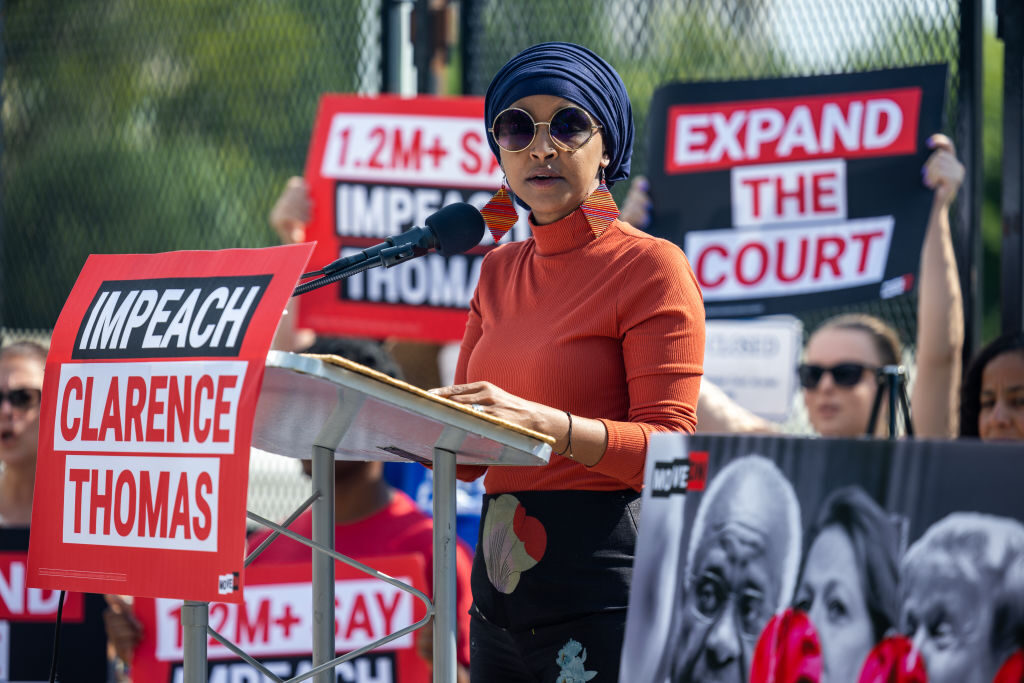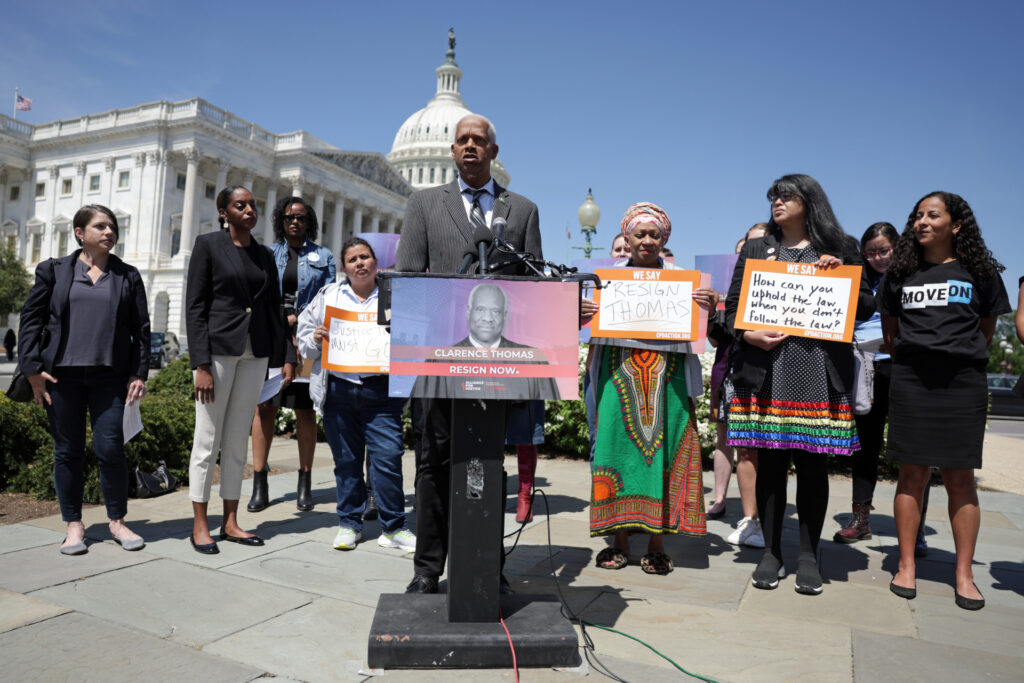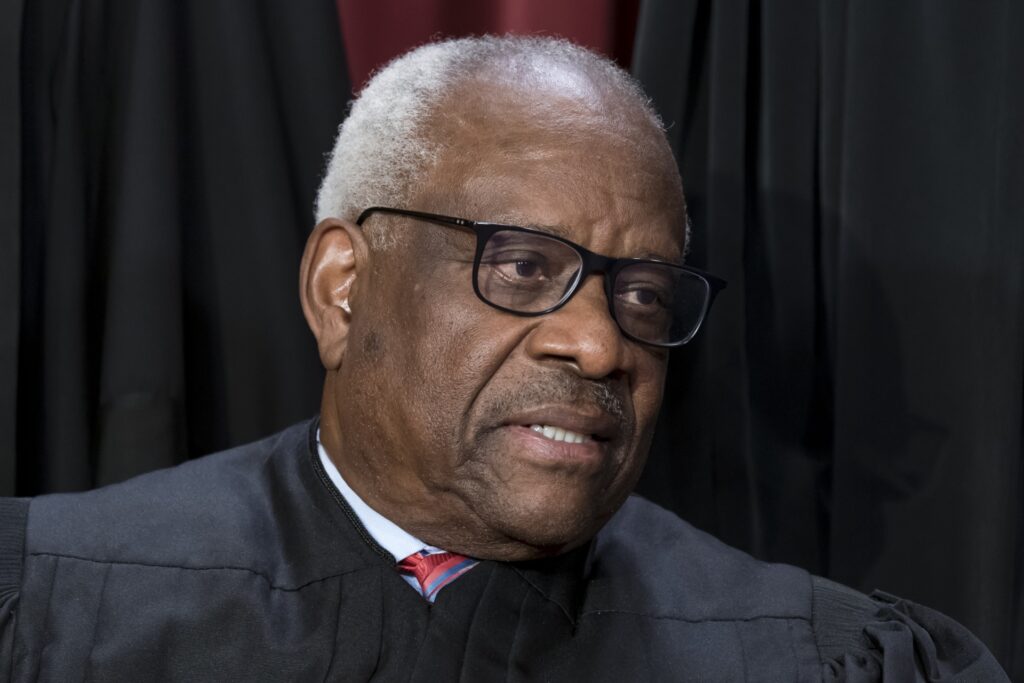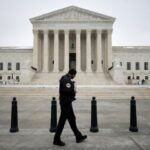
Leftists’ recent barrage of smears against Supreme Court Justice Clarence Thomas appear to be an unconstitutional attempt at reverse court-packing: forcing conservative justices off certain key cases to shape their outcome and, with it, the direction of the nation.
Liberals have recently fired up their attack machine into high gear on the longest-serving justice on the Supreme Court, alleging all sorts of novel ethical improprieties and pushing for alarming so-called “ethics” legislation in response.
These latest attacks focus on new theories of what the Left calls ethical violations, for things like accompanying wealthy friends on trips or going places on their yachts.
Thomas explained in a statement, “Early in my tenure at the Court, I sought guidance from my colleagues and others in the judiciary, and was advised that this sort of personal hospitality from close personal friends, who did not have business before the Court, was not reportable.”
Indeed these items were not covered by any ethics standard at the time they happened.
It is critical to understand that other justices have also acted on that same understanding. The late liberal icon Ruth Bader Ginsburg took luxury trips. Another liberal, Justice Stephen Breyer, has taken over 200 such trips and similar gifts. No one raised flags for those darlings of the political left.

Rep. Ilhan Omar speaks in front of the Supreme Court ahead of the delivery of a petition demanding the impeachment of Justice Clarence Thomas on July 28, 2022, in Washington, DC. (Photo by Nathan Posner/Anadolu Agency via Getty Images)
But that doesn’t stop hypocritical attacks against Thomas, such as from Rep. Bill Pascrell, who said of Thomas on X (formerly Twitter), “He’s corrupt as hell and should resign today.”
“Unprecedented. Stunning. Disgusting,” Squad member Rep. Pramila Jayapal breathlessly tweeted. “The height of hypocrisy to wear the robes of a #SCOTUS and take undisclosed gifts from billionaires who benefit from your decisions.”
However, these friends did not have cases before the court. They were not parties to litigation that Thomas was deciding. In fact, only one case is even claimed to have any real financial tie to a friend of Thomas, who had a financial stake in a matter where his name did not show up in a court filing that went before the Supreme Court, where Thomas would know who would benefit.
As another example, the Left screams that Thomas violated ethics rules when he allowed a Texas billionaire real estate friend to pay for tuition for Thomas’s great-nephew to attend private school. But the problem is there is no rule to the contrary. Ethics standards specify certain family members who either cannot receive gifts or for whom gifts must be disclosed. Great-nephews are not on that list.
What is going on here? This is court-packing in reverse. Democrats have abandoned for the time being efforts to pass a law adding new seats to the Supreme Court. They do not even have the votes in the Senate, to say nothing of the Republican-controlled House.
So instead they seek the same outcome by forcing recusals to reduce the number of conservative justices voting on a matter by passing what Democrats call an “ethics” bill for the Supreme Court.
One problem with such an approach should be sufficient to doom it: It’s unconstitutional for Congress to try controlling a coequal branch of government.
The Left says this is okay because they pass an ethics code for lower courts, but that’s constitutionally different. The Constitution does not create lower federal courts. Instead, it creates a Supreme Court — which is separate from Congress — then gives Congress authority to create lower courts under the high court. So the 13 federal appeals courts and the 94 federal trial courts are creatures of Congress. They exist only because Congress makes them, so Congress can put conditions on them that Congress cannot put on the Supreme Court. Just like the Supreme Court could not impose an ethics code on Congress.
Instead, just as Congress adopts ethics rules for their own members, the Supreme Court has its own ethical standards. And it appears that there are no reported incidents of any gift Thomas received that violated any ethics rule in place at the time.
So why do they single Thomas out for this abuse? Because they are obsessed with the man and have been since he was a conservative black federal appeals judge nominated to the Supreme Court in 1991.

Rep. Hank Johnson (D-GA) speaks during a news conference outside the U.S. Capitol calling for immediate resignation of U.S. Supreme Court Associate Justice Clarence Thomas on April 19, 2023, in Washington, DC. (Photo by Alex Wong/Getty Images)
The reality is that no justice on the court has a longer record as a rock-ribbed originalist than Thomas. In more than 30 years on the court, Thomas has been remarkably consistent in applying the principle that a democratically adopted Supreme Law of the Land must always be interpreted according to the publicly accepted original meaning of each of its provisions.
Some of these issues may seem like the fare of law geeks and professors who dwell in Ivory Towers.
Take for instance the 2010 case McDonald v. Chicago, asking whether the Second Amendment right to keep and bear arms applies to state and local governments through the Fourteenth Amendment. The Bill of Rights itself applies only against the federal government. When the Fourteenth Amendment was ratified in 1868, it extended most of those rights against the other levels of government as well.
The provision in the Fourteenth Amendment clearly designed to achieve those extensions is called the Privileges or Immunities Clause. But the Supreme Court almost neutered that provision in the 1873 Slaughter-House Cases. So since the 1890s, the Supreme Court has done that work of extension by saying that substantive rights like free speech are “incorporated” into the Due Process Clause.
That seems odd because all the Due Process Clause talks about is process: No state shall “deprive any person of life, liberty, or property, without due process of law.” But there’s still more than a century of precedent saying that clause goes beyond precedent.
Even the famed originalist Antonin Scalia said in the McDonald oral arguments that he hates the idea of “substantive due process,” but he believed that the line of cases going back more than a hundred years meant the court was locked into that approach.
Thomas stood alone, joining four other justices to agree that the Second Amendment applied to the states, but refusing to join the part of Justice Samuel Alito’s opinion that spoke about the Due Process Clause, filing a concurring opinion about the Privileges or Immunities Clause.

Associate Justice Clarence Thomas joins other members of the Supreme Court as they pose for a new group portrait, at the Supreme Court building in Washington, Friday, Oct. 7, 2022. (AP Photo/J. Scott Applewhite)
While those may sound like airy theories, they have real-life implications — implications that the Left consistently opposes, like gun rights.
The principle at stake with Thomas’s view of the law is that elected lawmakers should decide what laws Americans live under, and an elected president should lead and control the millions of federal employees who administer those laws. Judges are unelected and serve for life, so they should be faithful in following the law as adopted by the people American citizens voted for, not rule the way they would make policy if they could write the laws themselves.
The American people ultimately determine the makeup of the Supreme Court by the voters’ choices for president and U.S. senators. This principle has served the nation for more than two centuries.
These attacks on Thomas are just the latest attempt to pull off what FDR failed to accomplish more than 90 years ago.
American voters rejected court-packing when President Franklin Delano Roosevelt attempted it in the 1930s, understanding it was a power grab to subvert the independence of a coequal branch of government. Targeting certain justices for impeachment, resignation, or simply forcing them off certain cases has precisely the same effect and should be rejected just as firmly.
Ken Klukowski is a Breitbart News senior legal contributor.





